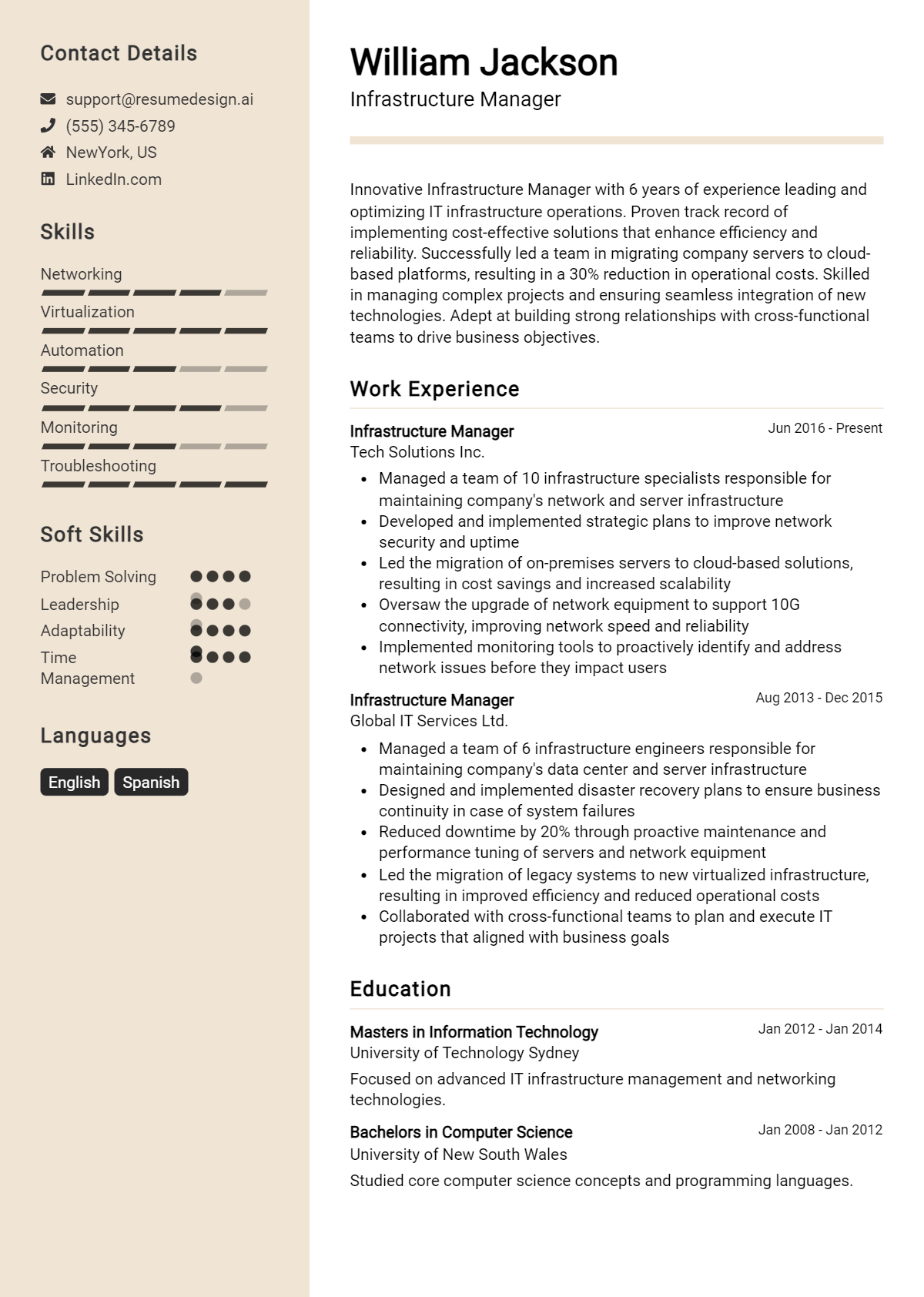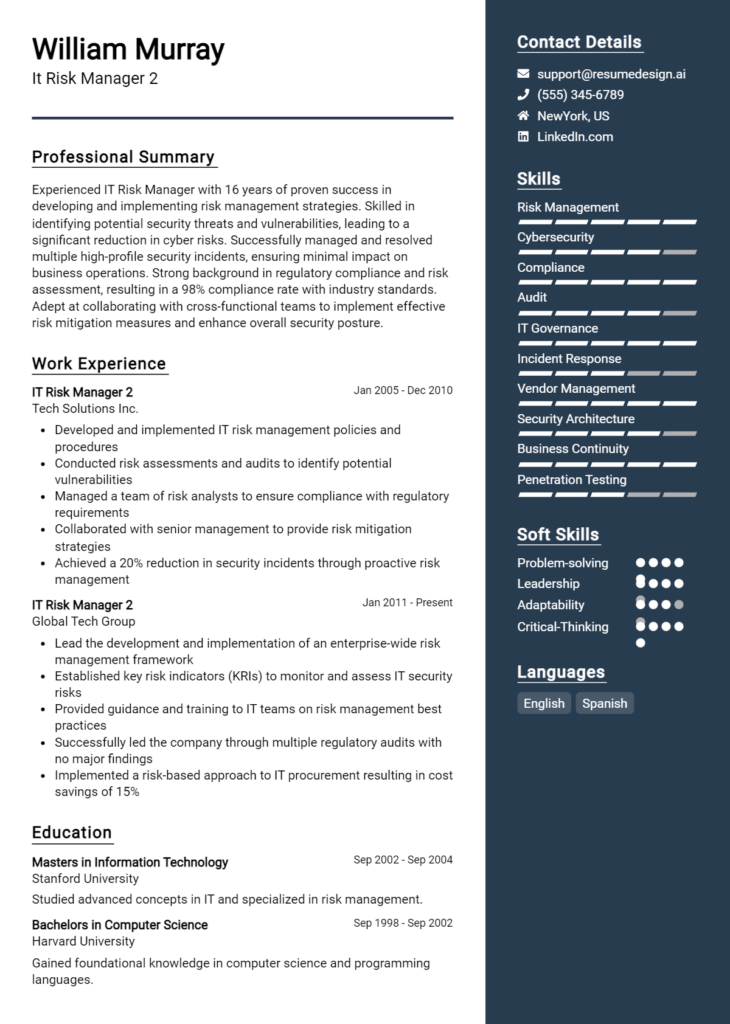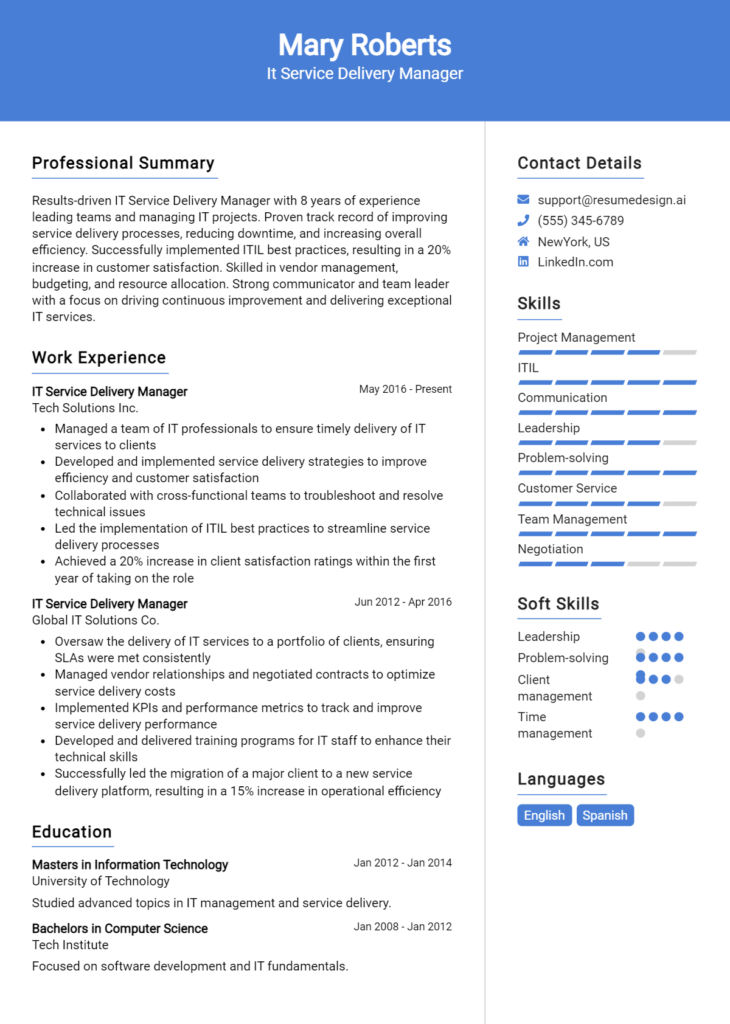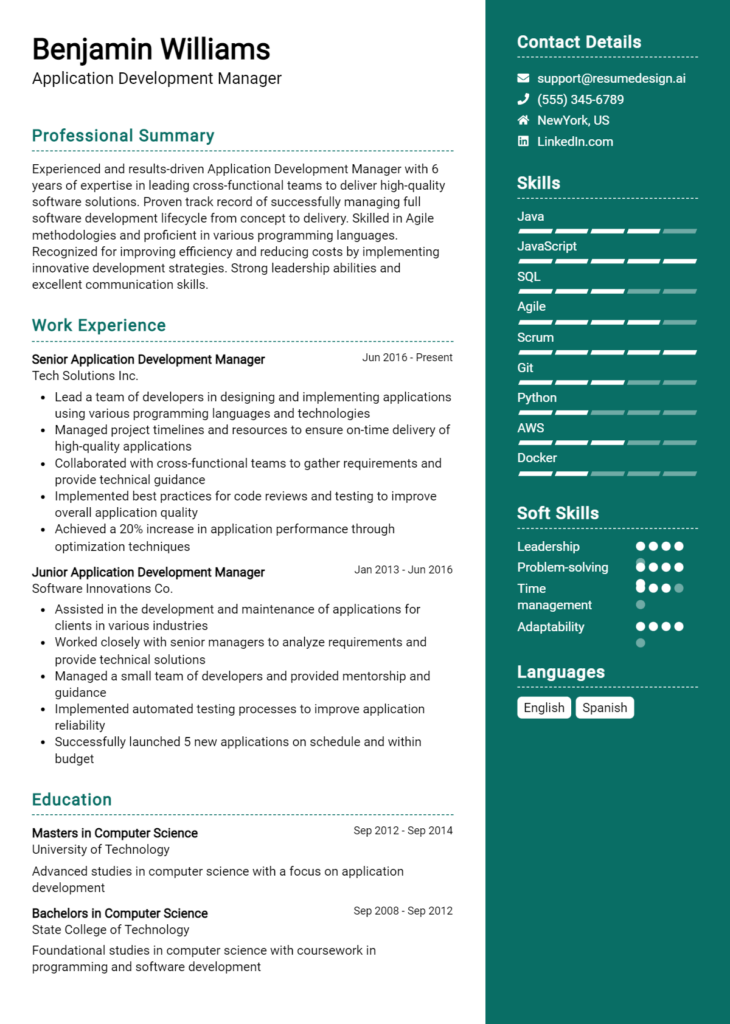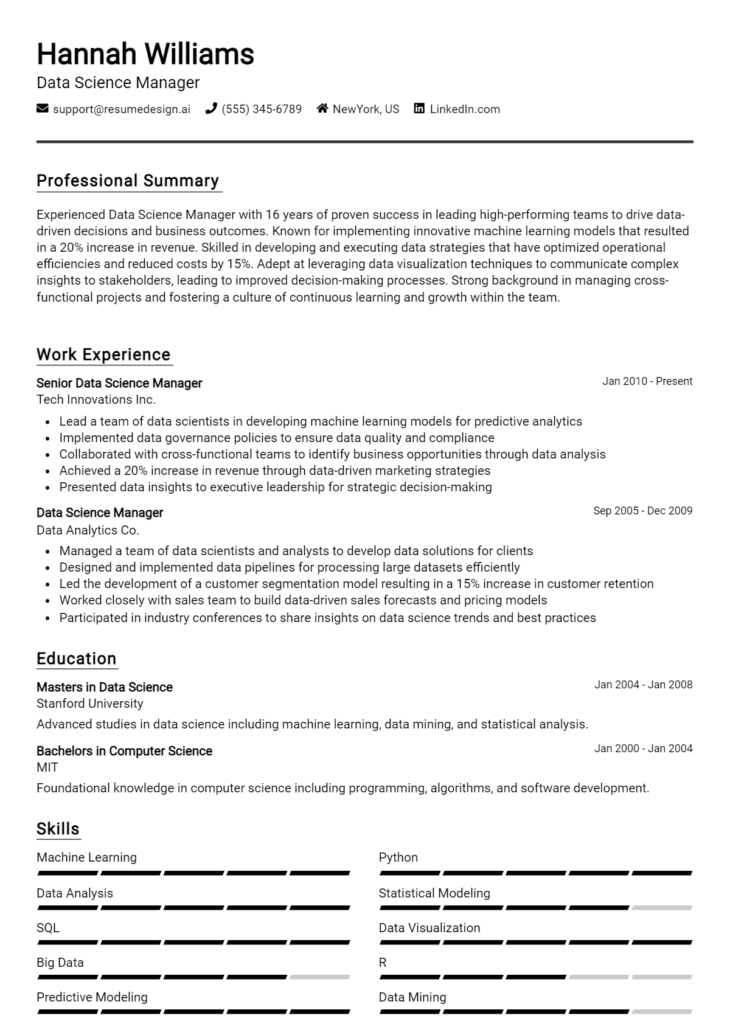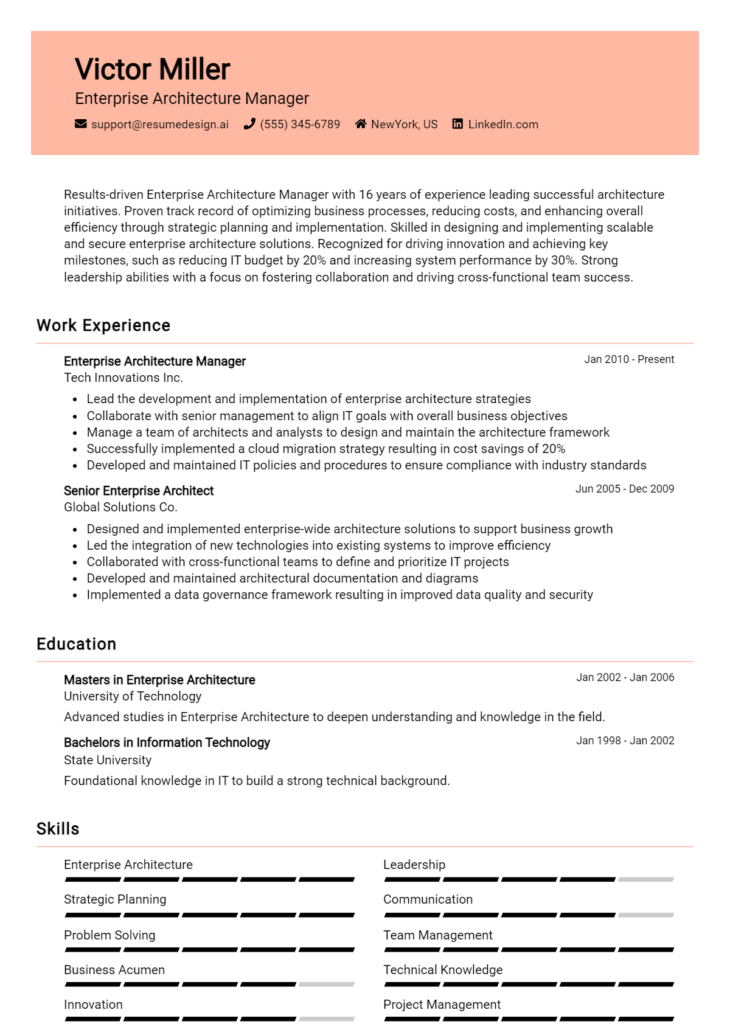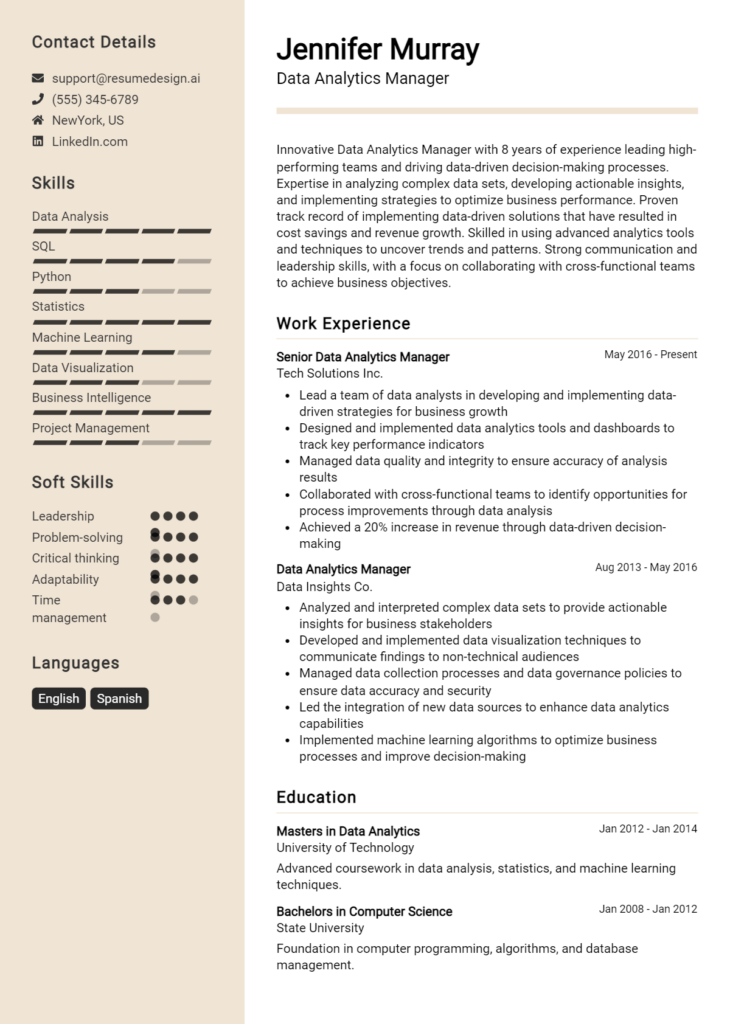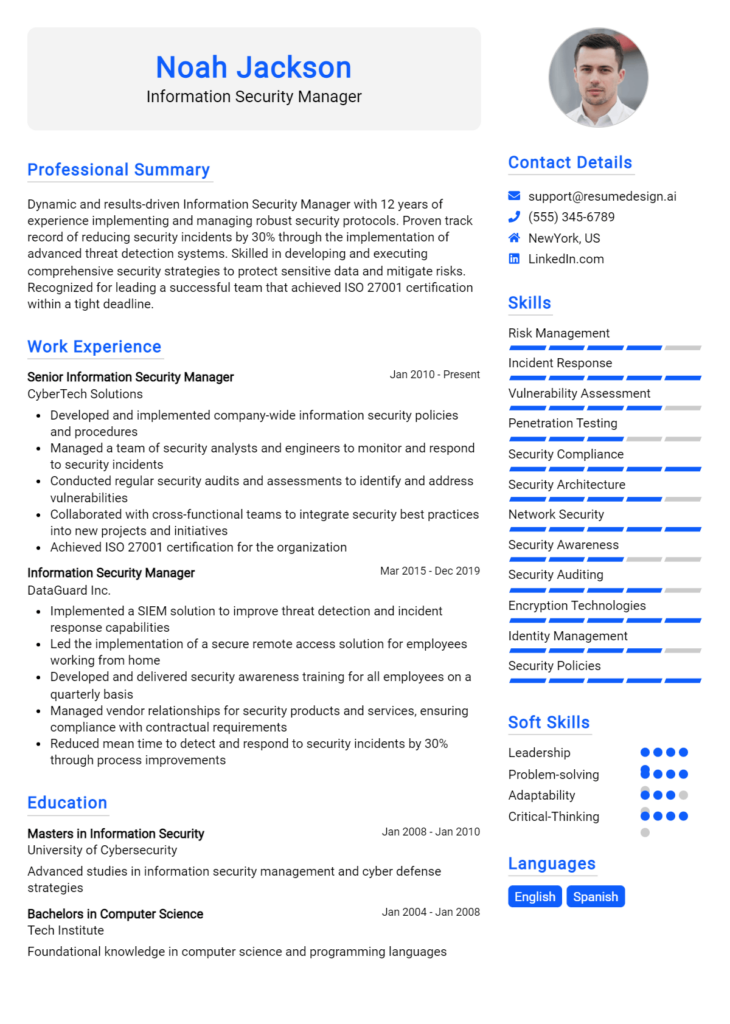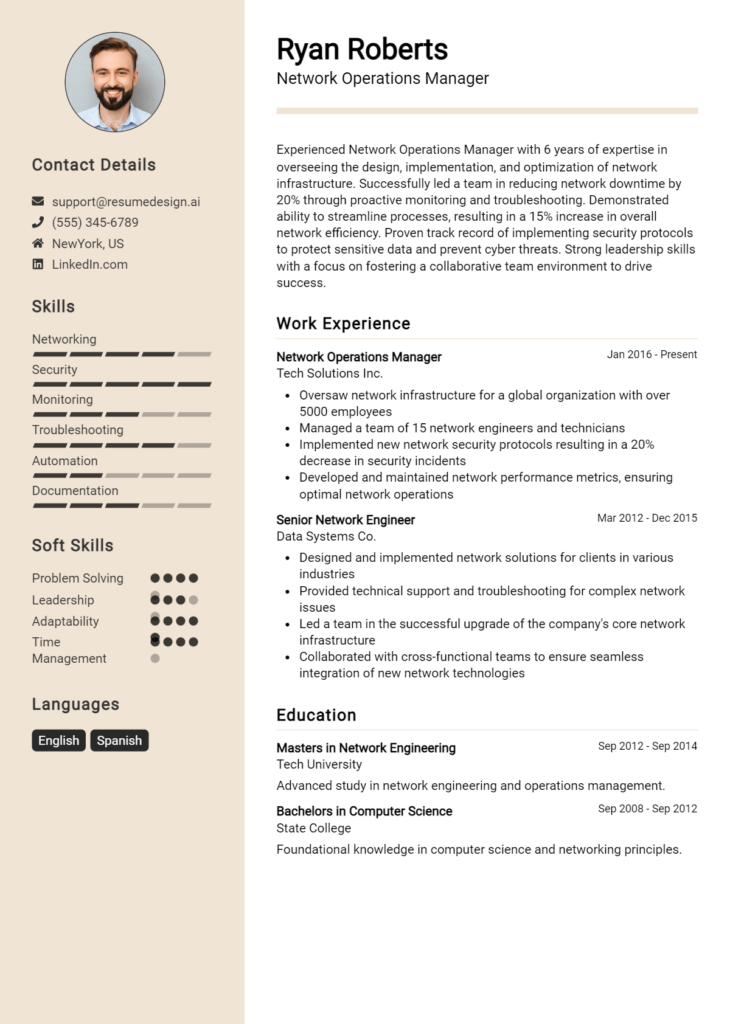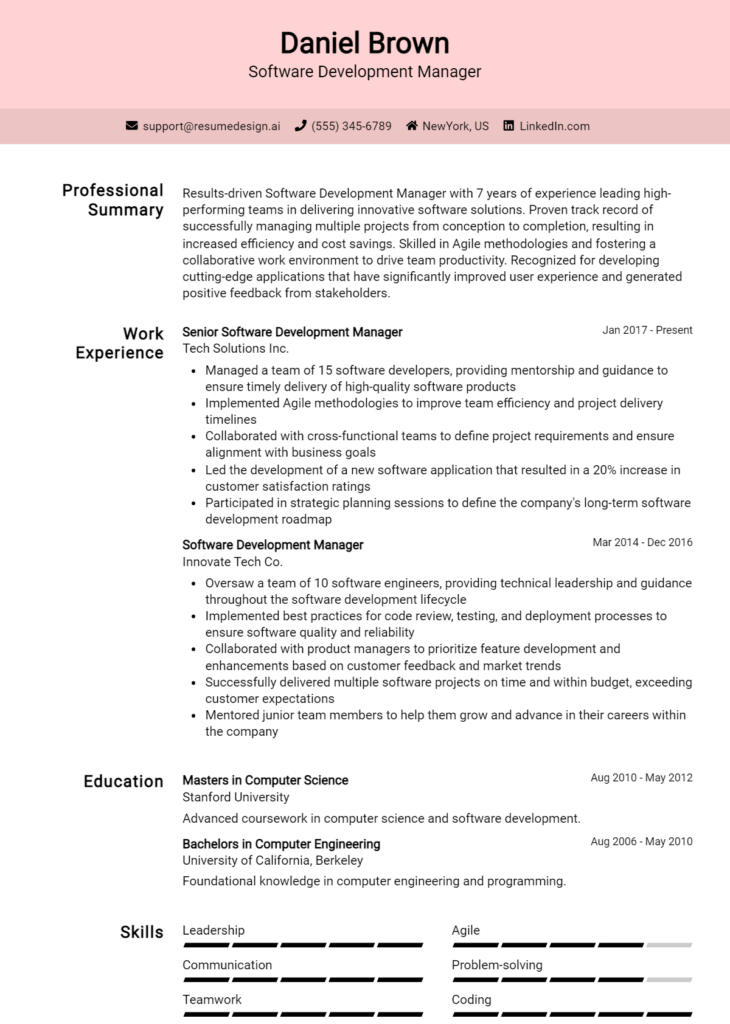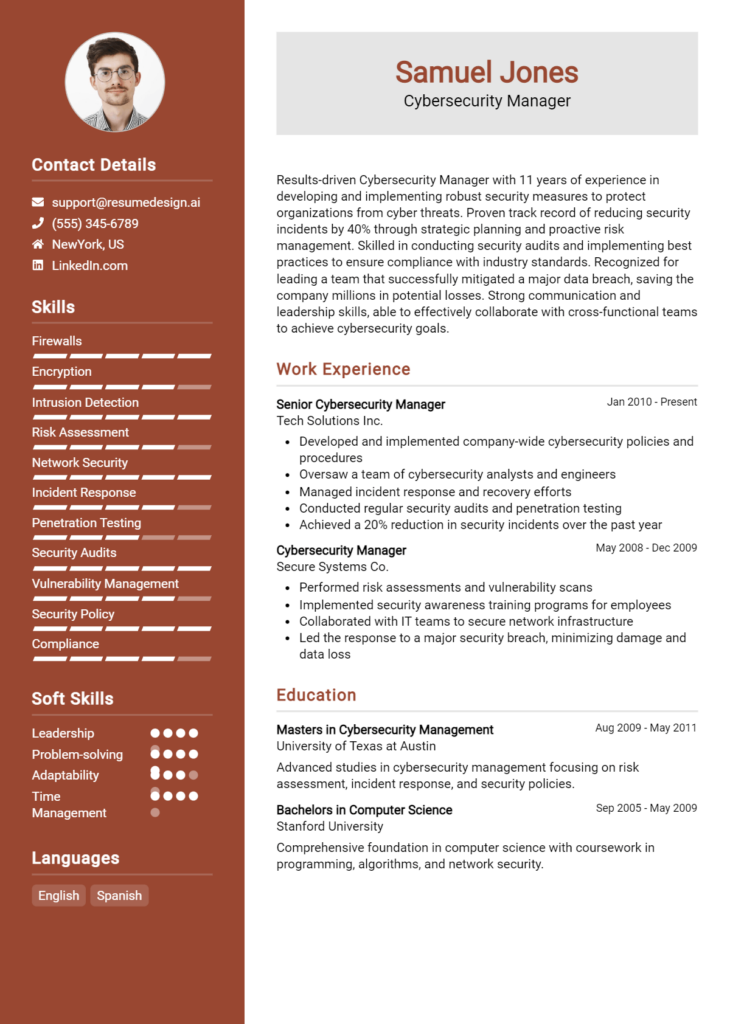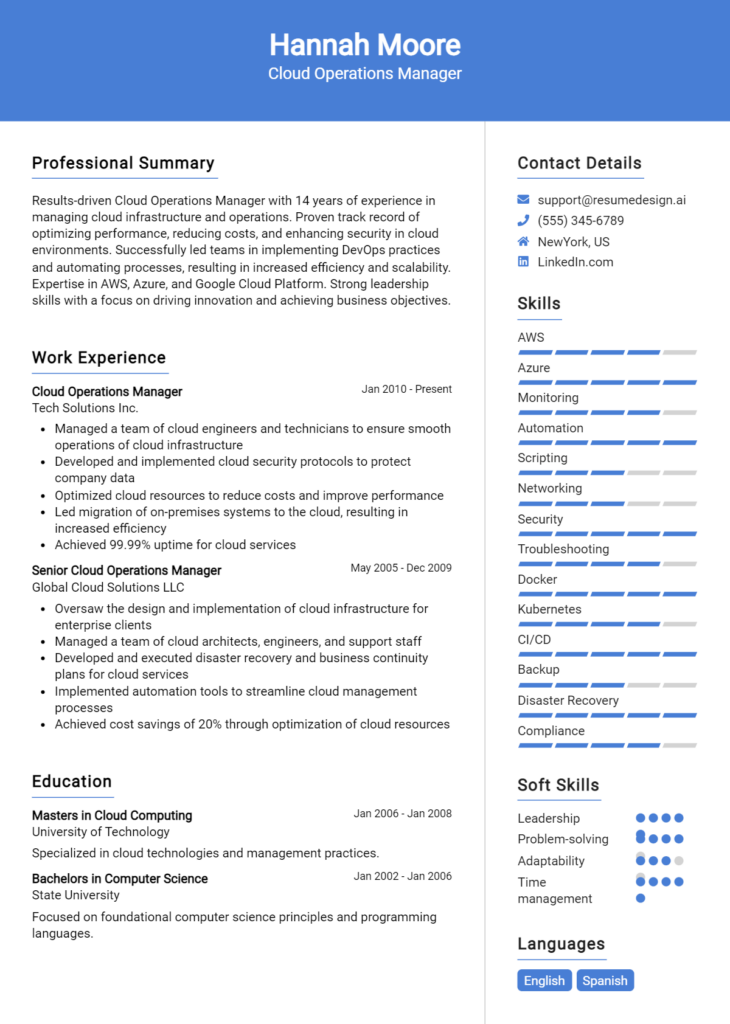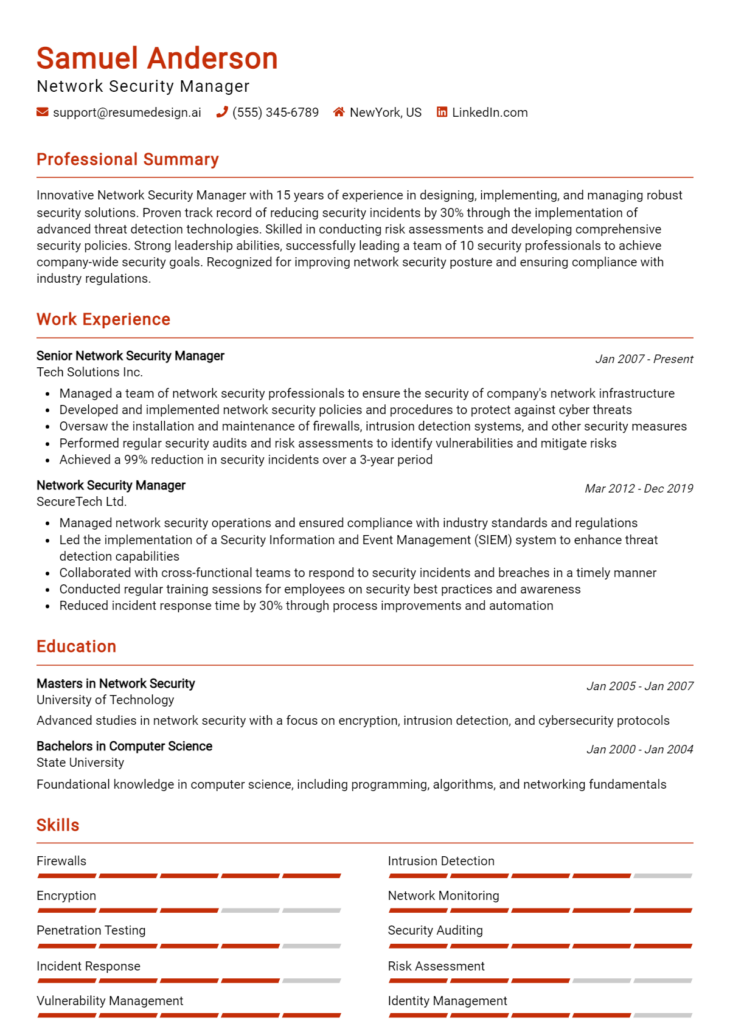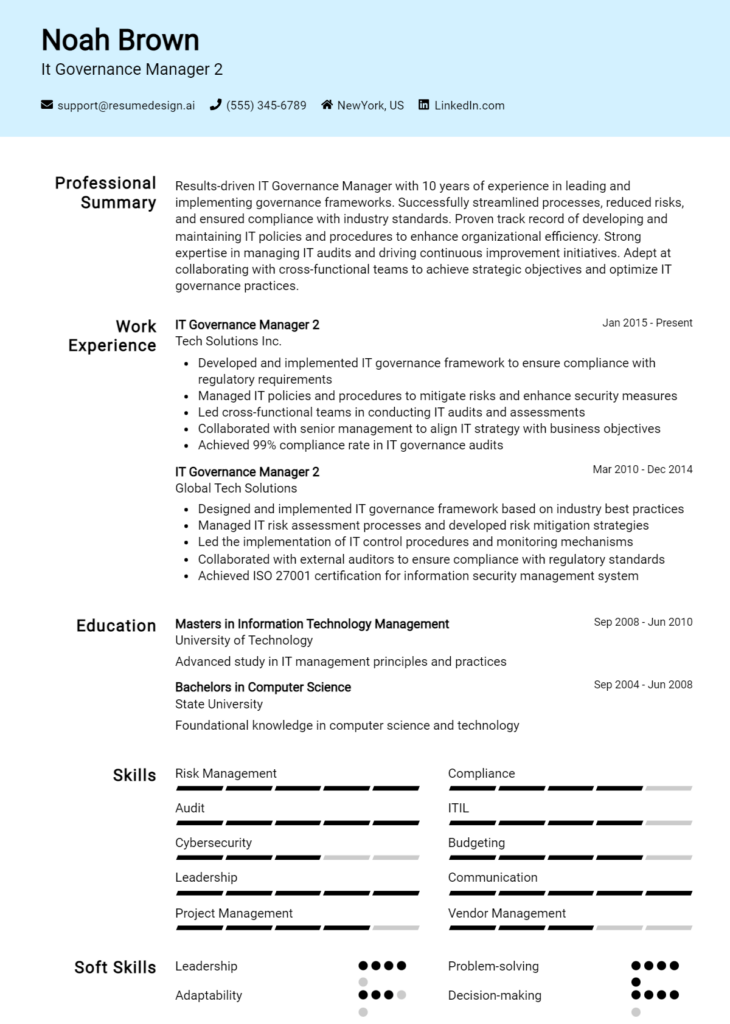Infrastructure Manager Core Responsibilities
The Infrastructure Manager plays a pivotal role in ensuring seamless operations across various departments within an organization. Key responsibilities include overseeing IT infrastructure, managing network systems, and ensuring data security. Essential skills encompass technical expertise, operational management, and strong problem-solving capabilities, which are crucial for optimizing resources and minimizing downtime. A well-structured resume can effectively highlight these qualifications, demonstrating how they contribute to achieving the organization's overall goals and maintaining efficient cross-department collaboration.
Common Responsibilities Listed on Infrastructure Manager Resume
- Oversee infrastructure design, implementation, and maintenance.
- Manage network security protocols and data protection measures.
- Collaborate with IT teams to ensure system integration and performance.
- Develop and implement disaster recovery and business continuity plans.
- Monitor infrastructure performance and troubleshoot issues.
- Evaluate and recommend new technologies to enhance infrastructure.
- Manage vendor relationships and negotiate contracts for services.
- Prepare budgets and allocate resources efficiently.
- Ensure compliance with industry standards and regulations.
- Lead infrastructure-related projects and initiatives.
- Provide training and support to team members and staff.
High-Level Resume Tips for Infrastructure Manager Professionals
In today’s competitive job market, a well-crafted resume is crucial for Infrastructure Manager professionals seeking to make a strong first impression on potential employers. Your resume serves as the initial point of contact, showcasing not just your skills, but also your achievements and professional journey. It’s essential that your resume effectively communicates your capabilities in managing complex infrastructure projects and teams. This guide will provide practical and actionable resume tips specifically tailored for Infrastructure Manager professionals, helping you stand out among the competition and secure that coveted interview.
Top Resume Tips for Infrastructure Manager Professionals
- Tailor your resume to match the job description by incorporating relevant keywords and phrases that highlight your alignment with the role.
- Showcase your relevant experience by detailing specific infrastructure projects you have managed, emphasizing your leadership and technical skills.
- Quantify your achievements with concrete metrics, such as percentage improvements in system uptime, cost savings, or project completion times.
- Highlight industry-specific skills, such as cloud computing, network management, or cybersecurity, that are essential for an Infrastructure Manager.
- Use a clear and professional format that enhances readability and ensures that key information stands out.
- Incorporate a summary statement at the top of your resume that encapsulates your professional background and primary qualifications.
- Focus on continuous learning by mentioning certifications and training relevant to infrastructure management, such as ITIL, PMP, or Cisco certifications.
- Include soft skills that are pertinent to the role, such as problem-solving, communication, and team leadership, supported by examples.
- Keep your resume concise—ideally one to two pages—while ensuring all critical information is included.
By implementing these tips, you can significantly enhance your resume's effectiveness, increasing your chances of landing a job in the Infrastructure Manager field. A polished and strategically crafted resume not only highlights your qualifications but also demonstrates your professionalism and readiness to take on the challenges of the role.
Why Resume Headlines & Titles are Important for Infrastructure Manager
In the competitive field of infrastructure management, a well-crafted resume headline or title plays a crucial role in catching the eye of hiring managers. A strong headline can encapsulate a candidate's key qualifications and professional identity in a single, impactful phrase, making it easier for employers to quickly grasp the value the candidate brings to the table. By being concise, relevant, and directly related to the job being applied for, an effective resume headline can set the tone for the entire application and encourage hiring managers to delve deeper into the candidate's experience and skills.
Best Practices for Crafting Resume Headlines for Infrastructure Manager
- Keep it concise: Aim for a headline that is brief yet informative, ideally no longer than one sentence.
- Be role-specific: Tailor your headline to reflect the specific position you are applying for, using relevant keywords.
- Highlight key strengths: Focus on your most significant skills, qualifications, or experiences that align with the job description.
- Use action-oriented language: Employ active verbs that convey your capabilities and achievements in infrastructure management.
- Avoid jargon: Use clear, straightforward language to ensure your headline is easily understood by all readers.
- Make it unique: Differentiate yourself from other candidates by showcasing a distinctive aspect of your professional identity.
- Align with the company’s needs: Research the organization and incorporate language or themes that resonate with its values and goals.
- Revise and refine: Continuously improve your headline based on feedback and evolving industry trends.
Example Resume Headlines for Infrastructure Manager
Strong Resume Headlines
Results-Driven Infrastructure Manager with 10+ Years of Experience in Cloud Integration and Optimization
Proven Leader in Infrastructure Development and Project Management, Specializing in Cost Reduction and Efficiency Improvement
Strategic Infrastructure Manager Committed to Enhancing System Performance and Reliability through Innovative Solutions
Weak Resume Headlines
Infrastructure Manager
Experienced Professional Seeking Opportunities
The strong headlines effectively convey the candidate’s experience and unique strengths while aligning with the specific requirements of the infrastructure manager role. They incorporate relevant keywords, showcase achievements, and provide a clear indication of the candidate's value. In contrast, the weak headlines are generic and lack specificity, failing to communicate any unique qualifications or strengths that would engage hiring managers and encourage them to learn more about the candidate. This lack of detail can lead to missed opportunities, as hiring managers may overlook candidates who do not stand out from the competition.
Writing an Exceptional Infrastructure Manager Resume Summary
Writing an exceptional resume summary is crucial for an Infrastructure Manager, as it serves as the first impression for hiring managers. A strong summary quickly captures attention by succinctly showcasing key skills, relevant experience, and notable accomplishments tailored to the specific job role. It acts as a powerful marketing tool that highlights what makes a candidate uniquely suited for the position, all while being concise and impactful. This overview sets the tone for the entire resume, guiding the reader toward the candidate's qualifications and potential contributions to the organization.
Best Practices for Writing a Infrastructure Manager Resume Summary
- Quantify achievements: Use numbers and data to illustrate your impact, such as cost savings or project success rates.
- Focus on relevant skills: Highlight specific technical and managerial skills that align with the job description.
- Tailor the summary: Customize your summary for each job application to reflect the requirements and language of the job description.
- Keep it concise: Aim for 3-5 sentences that convey your qualifications without overwhelming the reader.
- Use action verbs: Start sentences with strong action verbs to convey a sense of initiative and drive.
- Highlight leadership experience: Emphasize any managerial roles or responsibilities to showcase your ability to lead teams effectively.
- Showcase industry knowledge: Mention familiarity with industry standards, regulations, and emerging technologies relevant to infrastructure management.
- Include certifications: If applicable, mention relevant certifications that can enhance your credibility in the role.
Example Infrastructure Manager Resume Summaries
Strong Resume Summaries
Seasoned Infrastructure Manager with over 10 years of experience leading cross-functional teams to implement scalable IT solutions. Successfully reduced operational costs by 20% through strategic vendor negotiations and process optimization.
Results-oriented Infrastructure Manager specializing in cloud infrastructure and network security. Achieved a 30% increase in system uptime and improved response time by 40% through the implementation of proactive monitoring tools.
Dynamic Infrastructure Manager with a proven track record of overseeing multimillion-dollar projects. Led a team that upgraded the company’s infrastructure, resulting in a 50% decrease in downtime and saving the organization $500,000 annually.
Dedicated Infrastructure Manager with expertise in disaster recovery planning and business continuity. Spearheaded a comprehensive recovery strategy that improved recovery time objectives by 60%, ensuring seamless operations during critical incidents.
Weak Resume Summaries
Experienced manager looking for a job in infrastructure management. I have a background in IT and project management.
Infrastructure professional with skills in various technologies. Seeking to leverage my experience in a new role.
The examples of strong resume summaries are effective because they highlight specific achievements and quantify results, showcasing the candidate's direct impact on their previous organizations. They also focus on relevant skills and experiences tailored to the Infrastructure Manager role. Conversely, the weak resume summaries are vague and lack specific details that would capture a hiring manager's attention, making them appear generic and unremarkable.
Work Experience Section for Infrastructure Manager Resume
The work experience section of an Infrastructure Manager resume is crucial as it provides potential employers with a detailed overview of a candidate's professional journey and expertise. This section not only highlights the technical skills necessary for managing complex IT infrastructures but also demonstrates the ability to lead teams, implement strategies, and deliver high-quality projects. By quantifying achievements and aligning past experiences with industry standards, candidates can effectively showcase their value and readiness for the role, making a compelling case to prospective employers.
Best Practices for Infrastructure Manager Work Experience
- Use specific metrics to quantify achievements, such as percentage improvements in system performance or cost savings.
- Highlight technical expertise by mentioning relevant tools, technologies, and methodologies you have worked with.
- Demonstrate leadership skills by discussing team management, mentorship, and successful project outcomes.
- Align your experience with industry standards and best practices to showcase your knowledge of current trends.
- Include examples of cross-departmental collaboration to illustrate your ability to work well with diverse teams.
- Tailor your work experience to match the job description, emphasizing the most relevant experiences.
- Focus on outcomes and impacts rather than just responsibilities to convey the value you brought to previous roles.
- Use action verbs to start each bullet point, creating a dynamic narrative of your professional experience.
Example Work Experiences for Infrastructure Manager
Strong Experiences
- Led a team of 15 engineers in the successful migration of 300+ servers to a new cloud infrastructure, resulting in a 30% reduction in operational costs and a 50% increase in system uptime.
- Implemented a comprehensive monitoring system that decreased incident response time by 40%, enhancing overall service delivery and customer satisfaction.
- Managed a cross-functional project team to deploy a new disaster recovery solution, achieving a recovery time objective (RTO) of under 2 hours, well below the industry standard.
- Spearheaded a network optimization project that improved data transfer speeds by 25%, significantly boosting application performance for end-users.
Weak Experiences
- Responsible for some IT projects and tasks.
- Worked with a team to manage infrastructure.
- Participated in meetings regarding system updates.
- Assisted in troubleshooting minor network issues.
The examples labeled as strong showcase specific achievements, quantifiable results, and a clear demonstration of leadership and technical skills, thereby presenting the candidate as a capable Infrastructure Manager. In contrast, the weak experiences are vague and lack detail, failing to provide a sense of impact or significance, which diminishes the candidate's appeal to potential employers.
Education and Certifications Section for Infrastructure Manager Resume
The education and certifications section of an Infrastructure Manager resume plays a vital role in showcasing a candidate's academic background, industry-relevant certifications, and commitment to continuous learning. This section not only verifies the candidate's qualifications but also emphasizes their preparedness to effectively manage complex infrastructure environments. By providing details about relevant coursework, professional certifications, and any specialized training, candidates can significantly enhance their credibility and demonstrate alignment with the specific demands of the Infrastructure Manager role. A well-structured education and certifications section can set a candidate apart in a competitive job market, highlighting their dedication and expertise in the field.
Best Practices for Infrastructure Manager Education and Certifications
- List degrees and certifications in reverse chronological order, starting with the most recent.
- Include only relevant coursework that directly pertains to infrastructure management, such as network design, cybersecurity, or cloud computing.
- Highlight certifications that are widely recognized in the industry, such as ITIL, PMP, or Cisco Certified Network Professional (CCNP).
- Specify specialized training or workshops that relate to current technologies and best practices in infrastructure management.
- Use clear and concise language to describe your qualifications, avoiding unnecessary jargon.
- Consider adding any ongoing education efforts, such as online courses or webinars, to showcase a commitment to continuous professional development.
- Include the institution name, location, and date of completion for each educational achievement.
- Tailor the education and certifications section to align with the specific job description and qualifications sought by the employer.
Example Education and Certifications for Infrastructure Manager
Strong Examples
- M.S. in Information Technology Management, University of Technology, 2022
- Certified Information Systems Security Professional (CISSP), 2021
- Project Management Professional (PMP), Project Management Institute, 2023
- Cloud Computing Fundamentals, Coursera, 2023
Weak Examples
- B.A. in English Literature, State University, 1998
- Basic Computer Skills Certificate, Community College, 2015
- Old Certification in Microsoft Office Suite, 2010
- High School Diploma, 1995
The examples listed as strong are considered relevant because they reflect advanced degrees and certifications that directly support the skills and knowledge necessary for an Infrastructure Manager. They demonstrate a focus on pertinent areas such as information technology management and project management. In contrast, the weak examples are less effective; they highlight outdated or irrelevant qualifications that do not align with the requirements of the role, such as an unrelated degree in English Literature or basic computer skills that do not reflect the technical expertise needed in infrastructure management.
Top Skills & Keywords for Infrastructure Manager Resume
As an Infrastructure Manager, possessing the right skills is crucial for navigating the complexities of modern IT environments. The role demands a blend of both technical expertise and interpersonal abilities. A well-crafted resume reflects not only your professional qualifications but also your capability to lead teams, manage resources, and optimize systems. Highlighting your skills effectively can set you apart from other candidates, showcasing your readiness to tackle the challenges of infrastructure management. Whether you are emphasizing your technical proficiencies or your ability to communicate and collaborate with various stakeholders, the skills section of your resume is a key component that can significantly impact your job prospects.
Top Hard & Soft Skills for Infrastructure Manager
Soft Skills
- Leadership
- Communication
- Problem-solving
- Team collaboration
- Time management
- Adaptability
- Conflict resolution
- Strategic thinking
- Decision-making
- Stakeholder management
- Project management
- Negotiation
- Customer service orientation
- Empathy
- Mentoring and coaching
Hard Skills
- Cloud computing (AWS, Azure, Google Cloud)
- Network architecture
- Virtualization technologies (VMware, Hyper-V)
- Infrastructure as Code (IaC)
- Security frameworks and protocols
- Disaster recovery planning
- Database management
- System monitoring and optimization
- Configuration management tools (Ansible, Puppet, Chef)
- ITIL framework knowledge
- Scripting languages (Python, PowerShell)
- Compliance standards (ISO, GDPR)
- Performance tuning
- Backup and recovery solutions
- Server management
To further enhance your resume, consider exploring detailed insights on skills and work experience.
Stand Out with a Winning Infrastructure Manager Cover Letter
As an accomplished Infrastructure Manager with over eight years of experience in designing, implementing, and maintaining robust IT infrastructures, I am excited to apply for the Infrastructure Manager position at [Company Name]. My extensive background in leading cross-functional teams and optimizing system performance aligns perfectly with your mission to enhance operational efficiency and support business growth.
In my previous role at [Previous Company Name], I successfully oversaw a major infrastructure overhaul that resulted in a 40% reduction in downtime and significantly improved system resilience. My hands-on experience with cloud technologies, virtualization, and network security has equipped me with the skills necessary to navigate the complexities of modern IT environments. I take pride in my ability to analyze existing systems, identify areas for improvement, and implement strategic solutions that drive productivity and support organizational goals.
I am also passionate about fostering a collaborative team culture that empowers individuals to excel. I believe that effective management goes beyond technical expertise; it involves building strong relationships with team members and stakeholders. By promoting open communication and continuous learning, I have consistently enabled my teams to achieve their best work while meeting challenging deadlines and project objectives.
I am eager to bring my strategic vision and results-driven approach to [Company Name] as your next Infrastructure Manager. I am confident that my proactive mindset and commitment to excellence will contribute to your organization's success. Thank you for considering my application; I look forward to the opportunity to discuss how my background, skills, and enthusiasms align with the goals of your team.
Common Mistakes to Avoid in a Infrastructure Manager Resume
When crafting a resume for the role of an Infrastructure Manager, it’s essential to present your skills and experiences effectively to stand out in a competitive job market. However, many candidates make critical mistakes that can undermine their chances of landing an interview. Avoiding these common pitfalls can significantly enhance the quality of your resume and reflect your qualifications more accurately.
Lack of Tailoring: Failing to customize your resume for each job application can make it seem generic. Tailor your skills and experiences to match the specific requirements of the job description.
Overly Technical Language: While technical skills are crucial, using jargon that may not be understood by hiring managers can alienate them. Strive for a balance between technical terms and accessible language.
Ignoring Key Skills: Infrastructure management requires a mix of soft and hard skills. Omitting essential managerial skills, such as leadership or project management, can give an incomplete picture of your qualifications.
Inadequate Quantification of Achievements: Simply listing responsibilities without quantifying achievements can make your contributions seem less significant. Use metrics and specific examples to showcase your impact, such as “reduced downtime by 30%” or “managed a team of 10”.
Too Much Focus on Duties: Listing tasks without emphasizing outcomes can make your experience feel flat. Highlight the results of your actions to demonstrate your effectiveness in previous roles.
Neglecting Soft Skills: Infrastructure Managers need strong interpersonal skills to lead teams and communicate effectively. Failing to mention these can make your resume less compelling.
Formatting Issues: A cluttered or poorly organized resume can distract from your qualifications. Use clear headings, bullet points, and consistent formatting to ensure readability.
Omitting Professional Development: Infrastructure technology is constantly evolving. Not including certifications, training, or continuing education can make it appear that you are not keeping up with industry trends.
Conclusion
As an Infrastructure Manager, you play a crucial role in ensuring the stability, security, and efficiency of an organization's IT infrastructure. Key responsibilities include overseeing network architecture, managing cloud services, implementing disaster recovery plans, and ensuring compliance with industry standards. Successful Infrastructure Managers combine technical expertise with strong leadership skills, enabling them to manage teams effectively while also liaising with other departments to align IT infrastructure with business goals.
In the competitive job market, a well-crafted resume is essential for showcasing your skills and experience to potential employers. It’s important to highlight not just your technical knowledge, but also your achievements in managing complex systems, leading projects, and optimizing infrastructure for better performance.
To ensure your resume stands out, consider utilizing various resources available to you. Explore our resume templates for a professional layout, use our resume builder to create a tailored document, and check out resume examples for inspiration on how to effectively present your qualifications. Additionally, don't overlook the importance of a strong introduction with a polished cover letter template to complement your resume.
Take action today by reviewing and updating your Infrastructure Manager resume. With the right tools and resources at your fingertips, you can enhance your presentation and increase your chances of landing your dream role.

